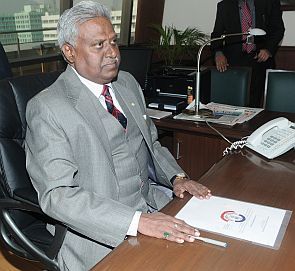 Central Bureau of Investigation Director Ranjit Sinha on Monday said "collusive corruption" in which there is a willing bribe-giver is emerging as a "formidable" challenge for institutions fighting corruption.
Central Bureau of Investigation Director Ranjit Sinha on Monday said "collusive corruption" in which there is a willing bribe-giver is emerging as a "formidable" challenge for institutions fighting corruption.
"When the talk turns to corruption, the focus is on the demand side of the equation, on public officials who abuse their office for private gain. Frequently, the supply side is given less attention.
"Those who pay bribes are sometimes depicted as innocent parties, victims of extortionary practices of wily public servant," Sinha said during the seventh Interpol global programme on anti-corruption, financial crime and asset recovery.
The agency is probing a number of high-profile crimes where natural assets such as spectrum, iron ore and coal have allegedly been allotted to parties who willingly engaged in graft to grab these lucrative contracts. The CBI director said corruption is a two-way street and for every bribe taker there is a bribe payer.
"Collusive corruption is a formidable challenge, particularly for public individuals and institutions fighting bribery and corruption," he said.
Sinha said targeting the supply-side of corruption is imperative and India is in the process of addressing this emerging area as part of various measures that are being adopted to make Indian legal framework compliant to United Nations Convention against Corruption.
The CBI chief said illicit funds or proceeds of crime which are moved across borders originate from three sources namely bribery and corruption, criminal activity and commercial tax evasion.
"These illicit flows are facilitated by loopholes in the international financial system, the system's opacity and the lack of enforcement of due diligence requirements and more importantly the provisions of bank secrecy and privacy in tax havens," Sinha said.
Sinha said law enforcement agencies have to look beyond borders to track illicit funds siphoned off their countries and ensure their freezing and subsequent attachment.
The chief said recovery of these assets is a vexed process of administering justice but without achieving it, one can't claim that justice is delivered.
"The conviction based asset forfeiture is time consuming and labyrinthine. Some countries resort to non-conviction based confiscation, which is simple in procedure and swifter in recovery. Hence, non-conviction based confiscation is being adopted increasingly," Sinha said.
Sinha said in many jurisdictions, non-conviction based confiscation of assets can be established on a lower standard of proof and this helps ease the burden on the enforcing authorities.
"By exploring a wide variety of issues such as criminalisation, managing conflict of interest in the public and private sectors, internal company controls, corruption between private sector agents and sustainable development, the programme would like to bring much needed clarity in the minds of regulatory and law enforcement officers of this region," he said.











 © 2025
© 2025